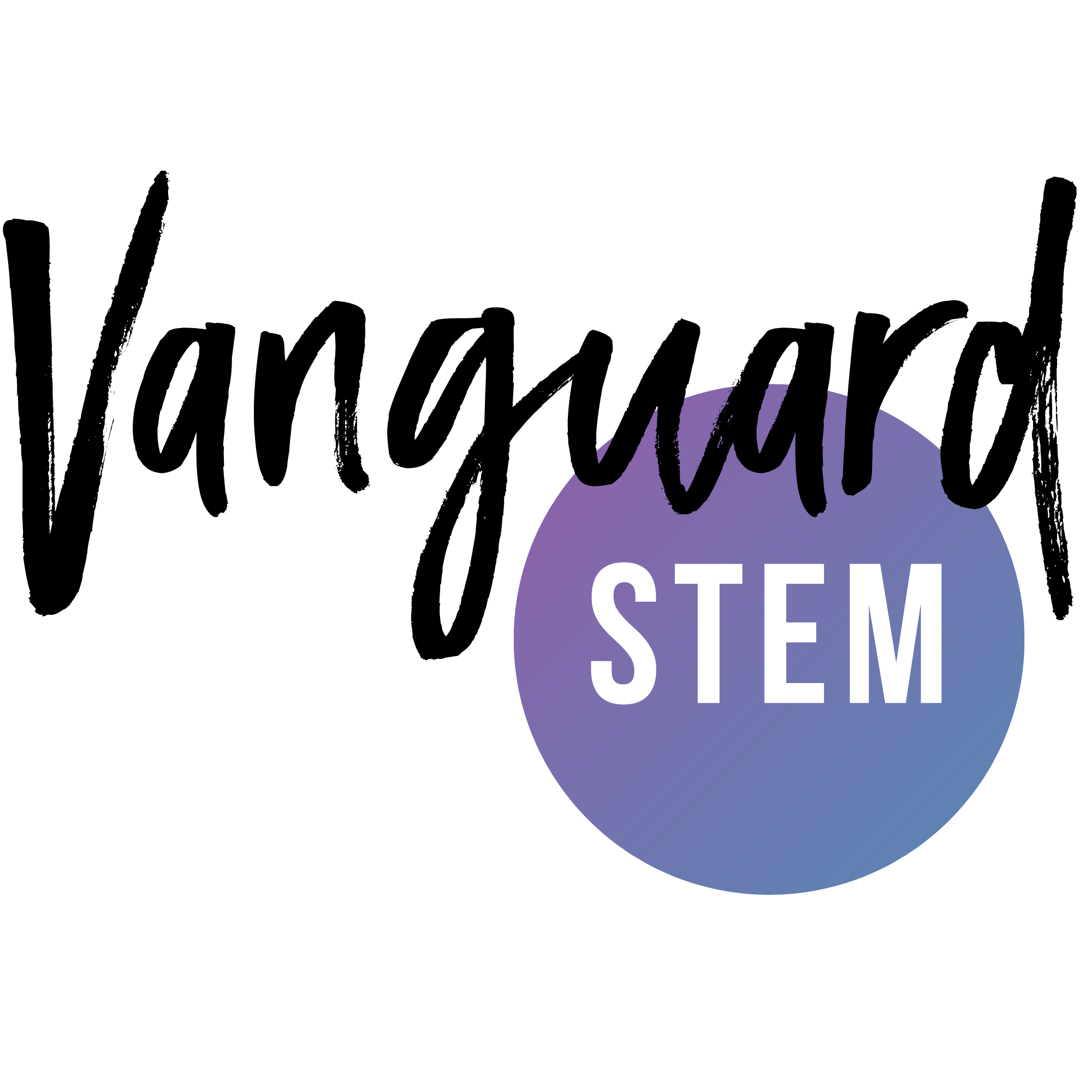How can we approach mentorship in a way that reflects the deeper levels of systemic and ideological change we so desperately need?

If you’ve been keeping up with VanguardSTEM’s programming over the years, then chances are you’ve heard about our #GuerillaMentoring campaigns both online and in-person. “Guerilla Mentoring” was born in 2018 (and coined by Dr. Danielle N. Lee!), when #VanguardSTEM began Conference Crashing at professional STEM conferences to bring mentorship by women and non-binary POC in STEM to emerging scholars with similar identities. We work in, around, and beyond traditional academic and industrial systems to bring collective wisdom, support, and community to our people wherever they show up as their best scientist selves.
Last year, we shared our Intersectional Scientific Methodology (ISM) with the world in our very first peer-reviewed publication. The ISM examines how identity, experiences both professional and personal and technical expertise all influence the way we engage the scientific method. We’ve broken down the ISM for you in the season 7 finale of On The Vanguard. You can also read a breakdown of the ISM as it relates to mentoring here. We’ve deployed the ISM framework to define how all of VanguardSTEM’s efforts aim to nurture and affirm identity within scientific and professional endeavors. This time, we’re creating a mentoring hyperspace to reach our community members all around the world.
Decolonized Mentorship
Our team is BEYOND excited to introduce the Decolonized Mentorship framework to the world. Developed by VanguardSTEM’s mentoring maven, Arianna Long, it is the culmination of years of reading, practicing, and reflecting on what mentorship looks like in support of our vision of a more diverse and inclusive STEM culture.
“While I did put these words into place, I want to emphasize that I am not the first to do so. There are other people who have published on similar concepts (some listed at the bottom of this article), and even more who embody and preach these principles every single day. I am humbled by these individuals, by their personal and cultural perspectives. I dedicate this work to them and to my own mentors, who inspire and encourage me to excel not just as a leader, but also as a community member.” — Arianna Long, M.S., PhD exp. 2022
This framework was developed through a Queer, Black Feminist lens while constantly asking: what would a STEM community that centers support, connection, and growth look like? The Decolonized Mentorship philosophy has four main prongs that work together form a vision for the future STEM culture we hope to see flourish within the VanguardSTEM hyperspace and beyond.
1. Collective Wisdom
This component emphasizes collaboration, collective problem solving, and diversity in perspective in order to build a community of support around mentees. This prong is about opening doors, inviting people in, and widening our circles. It’s about removing barriers to access, questioning the true purpose of competition/ranking/gatekeeping, and softly leaning on your community in times of need without shame or transaction.
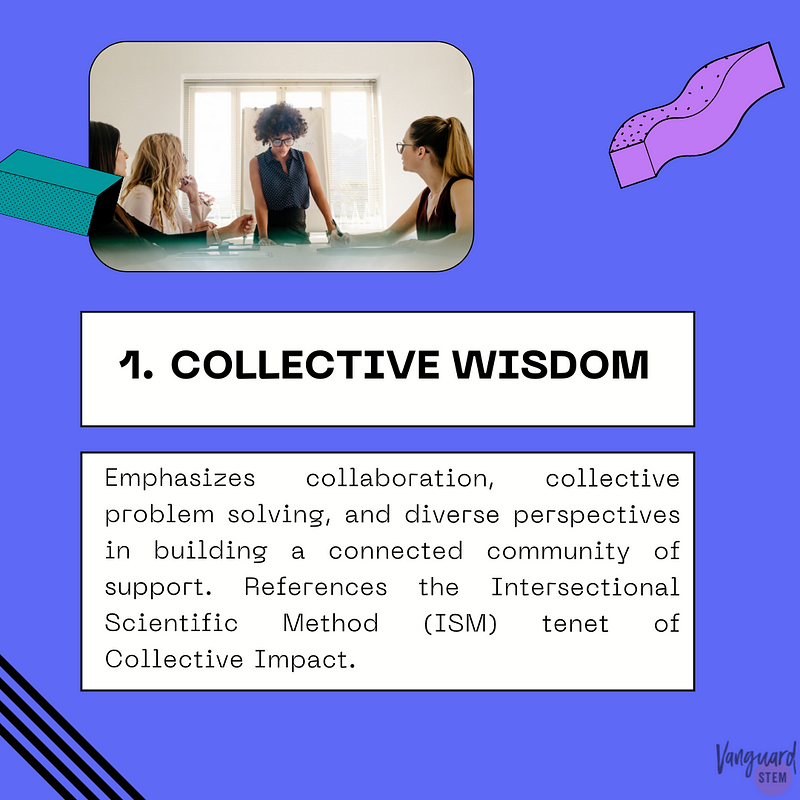
This principle is closely tied to the ISM tenet of Collective Impact. By examining the collective impact of our work, we acknowledge that we do not practice “science for science’s sake” and instead recognize the generative, restorative and creative potential of one’s endeavors to benefit their perceived community.
Some examples of this might be introducing your mentees to other outside experts for research or career support, troubleshooting / problem solving together during group meeting, or asking a mentee to give a brief presentation or tutorial on something they’ve recently mastered (giving them a chance to be recognized as an expert). A more advanced version of this might be merging two competitive research collaborations with similar goals so that the already-scarce resources can be shared and used to support budding researchers.
2. Abundance Within All
This one is all about seeking, acknowledging, and amplifying the strengths and uniqueness of each individual, with extra effort to reconcile personal and professional identities.
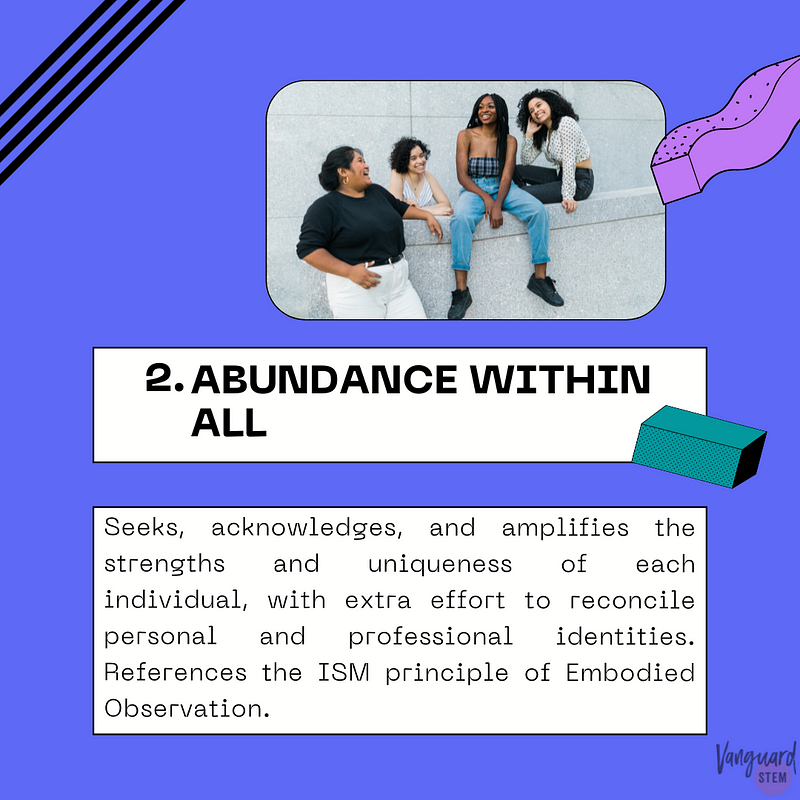
“Abundance Within All” draws from the ISM principle of Embodied Observation through which VanguardSTEM aims to regard lived experience as equally important as technical expertise. Acknowledging the totality of experiences that influence our observations of the world, is not only critical to authentic scientific inquiry, but to impactful mentorship as well.
We want to take the time to learn about our mentees, their previous experiences, goals, and cultural identities. We want to reject the idea that there is only one way to do something, and move away from the deficit mindset. We want to pay attention to their areas of growth, and celebrate that growth often (positive reinforcement matters). But we also want to take the time to reflect on what skills or traits we believe are necessary for success in our profession, and question their origins: are these skills truly necessary, or are they personality traits that make mentees more palatable to the dominant culture?
3. Examines the 3 P’s
The third prong encourages active awareness, reflection, and acknowledgement of how power, politics and privilege (3 P’s) impact the mentor-mentee relationship as well as the mentee’s individual experiences in the field. This one is about using the 3 P’s to protect and uplift your mentee, while also understanding how power, politics, and privilege likely influence your mentee’s experience in a way that’s different from yours.
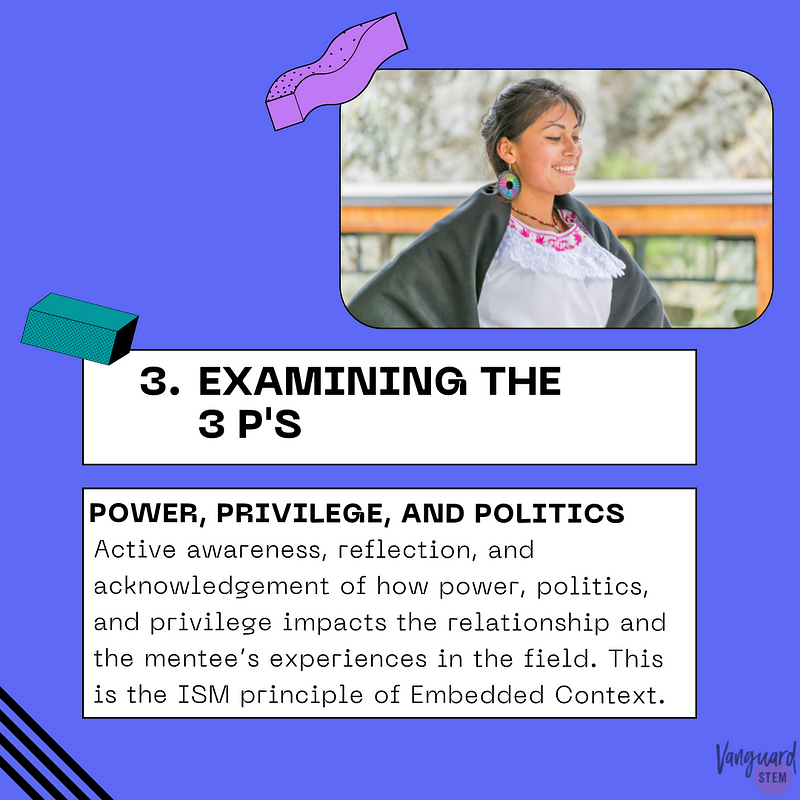
Through the ISM principle of Embedded Context, we foster a reflection of how individual, structural, and historic oppressions impact one’s sense of relevant scientific inquiry. Similarly, examining the 3 P’s encourages acknowledging and accepting how current events may impact your mentee’s current mental health state, and therefore productivity. It’s also about aggressively advocating for your mentee when there is harm done by one of your own colleagues (like perhaps that certain emeritus faculty who really likes to use the reply-all feature to share their social and political stances). And it’s about listening when your mentee raises an issue with a system or policy that is clearly a barrier to their success, and then doing something about it.
4. Intentional Connection
This last component is all about intentional relationship building through sharing vulnerabilities, personal and professional milestones, and personal cultural practices.
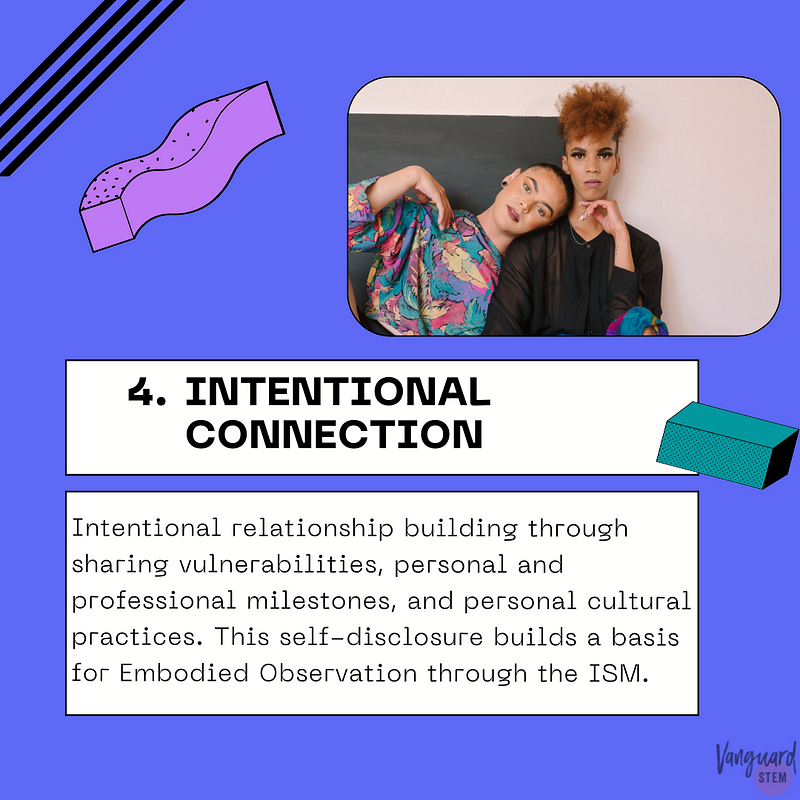
Much like the aforementioned ISM principle of Embodied Observation, Intentional Connection is about acknowledging your and your mentees’ cultural and religious identities so that you can share, celebrate, and respect important holidays. It’s about sharing your own failures to provide more transparency on the profession, and also normalize failure as part of the process. It’s about building trust with your mentee, showing them that yes, even you, are human; even you need rest, time to grieve, heal, celebrate; time to explore and enjoy your other hobbies. Such a huge part of mentorship is leading by example and, in this framework, that means being vulnerable so that your mentees feel they can trust you when they are feeling vulnerable.
You may have noticed that these four prongs are not mutually exclusive. That’s intentional. In a very “meta” way, these prongs are most effective when used in a collaborative, interconnected fashion. They lean on each other, weaving together to create a soft, yet supportive launch pad for everyone involved. That same launch pad serves as a cushion for when our mentees struggle and slip while climbing the metaphorical ladder. It’s firm and unwavering in it’s support. But it is flexible and malleable, forming tenderly to each mentee’s unique shape to support them as they fall, get back up, and jump off it again.
Join our Guerilla Mentoring Session!!
On January 26, 2022 we’ll be deploying this framework in real-time with our #VSVillage. We invite our community to reflect on their mentorship experiences through a more Queer, Black feminist lens. The goals of this session is to uplift and highlight Black, Indigenous women of color and non-binary people of color who embody these concepts across multiple levels of STEM interests.
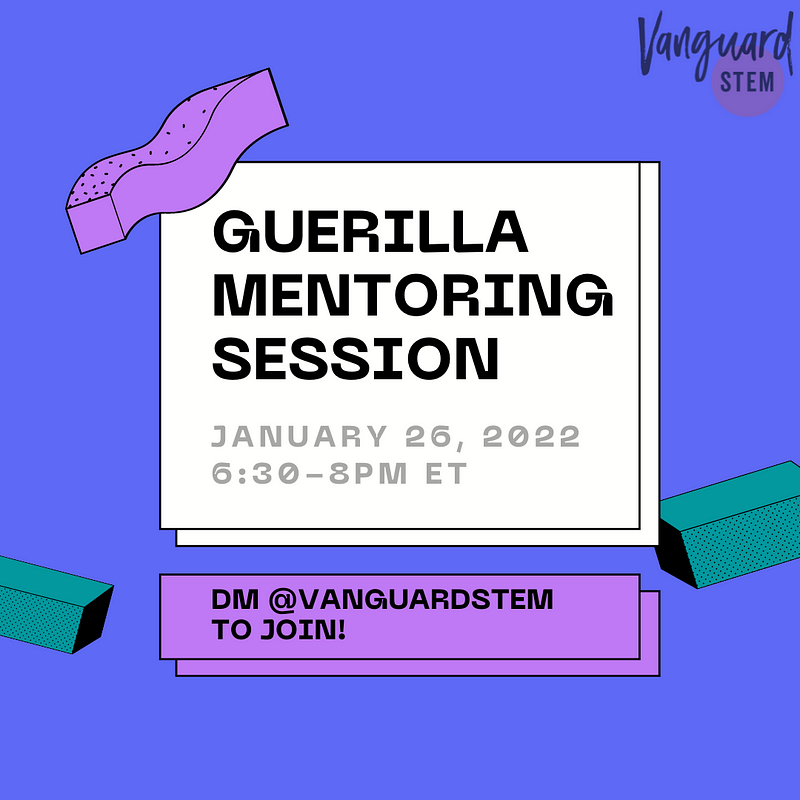
The event will be for 90 minutes on Wednesday, January 26th from 6:30pm-8pm EST on Zoom. Prior to the event, mentees will be given a roster of potential mentors and select 2–3 with whom they would like to meet. Based on these responses, the #VanguardSTEM team will internally coordinate small groups of mentees (1–5 folks) per mentor.
To Volunteer as a Guerilla Mentor:
We’re seeking women and non-binary scientists, engineers, doctors, industry leaders, non-profit founders, educators, sociologists, faculty, post-docs, and senior graduate students (with ABD status) who identify as persons of color. Based on previous iterations, we anticipate most mentees at the event will be students (undergraduate or graduate) seeking career advice, so if you have a passion for what you do, advice on how to get there, and/or are willing to share your journey — we’d love to have your expertise in the virtual room on Jan. 26! Mentee sign-up opens January 17, 2022. If you’d like to select from our roster of poppin’ mentors contact us.
DM @VanguardSTEM across any of our social media platforms to register.
If you can’t make it, don’t worry. This is just the first of many opportunities for virtual mentoring with VanguardSTEM’s community of all-star women and non-binary STEM practitioners.
This article was originally published on January 11, 2022 on VanguardSTEM.com as part of our National Mentoring Month series.
If you value the work we do and the content we provide at #VanguardSTEM, please consider donating to our parent not-for-profit, The SeRCH Foundation, Inc., to help support this work.
